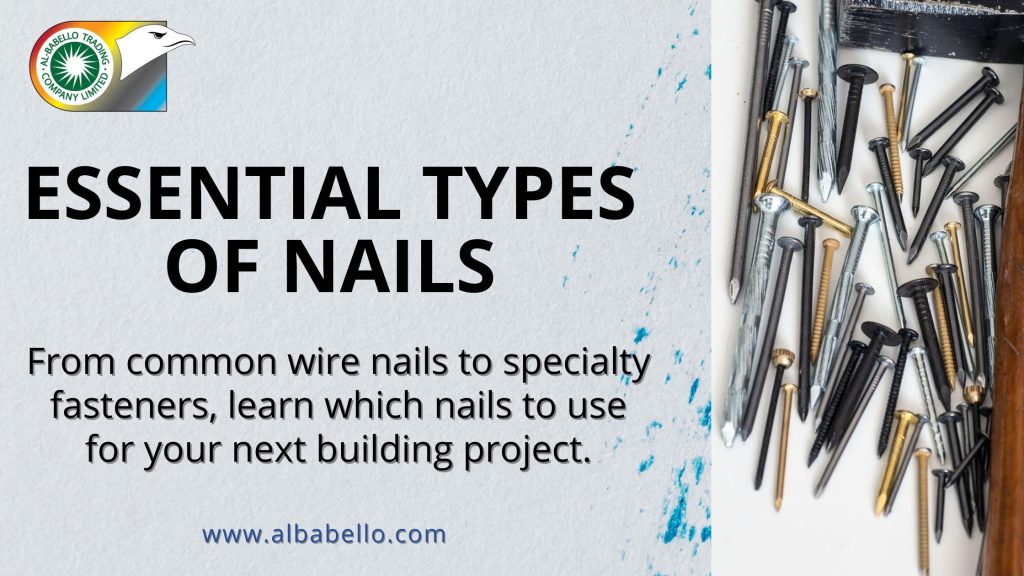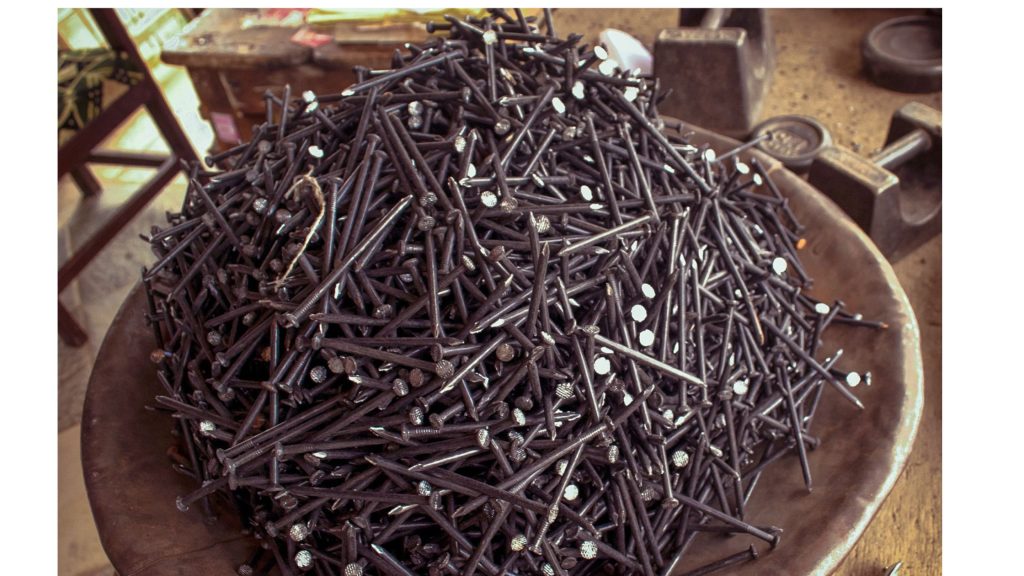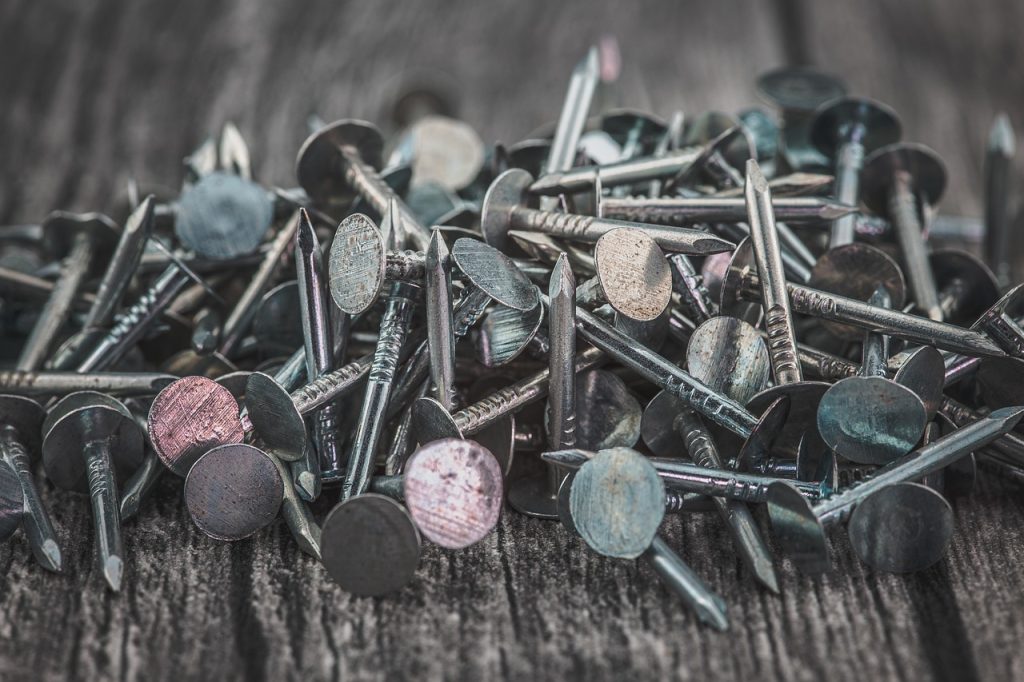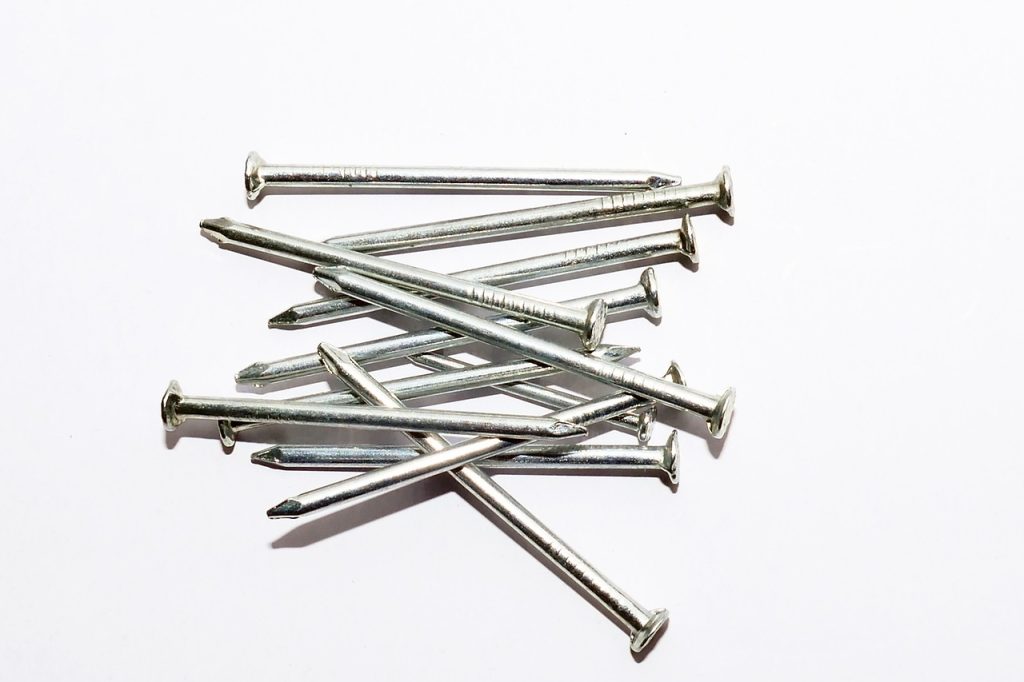
Did you know that the global nail gun market is expected to reach $3.5 billion by 2028? That’s a lot of nails being fired! Whether you’re a seasoned contractor or a DIY enthusiast, choosing the right type of nail for your construction project is crucial.
In this comprehensive guide, we’ll hammer out the details of various nail types, their uses, and why selecting the proper fastener can make or break your build.
Let’s dive in and nail down this essential knowledge!
Common Wire Nails: The Backbone of Construction

Wire nails are the unsung heroes of the construction world, forming the foundation of countless building projects across Nigeria and Sub-Saharan Africa.
These versatile fasteners are essential for joining wood and other materials, making them a staple in every contractor’s toolkit and a key product offering from Al-Babello Trading Company.
Definition And Characteristics
Wire nails, also known as bright common nails, are characterized by their smooth, cylindrical shanks and flat heads. They’re typically made from steel wire, which is cut to length and then shaped with a head on one end and a point on the other.
The manufacturing process involves drawing the wire through a series of dies to achieve the desired diameter, a technique that ensures consistency and strength.
Key Features Of Wire Nails
- Smooth shank for easy driving
- Flat head for a secure hold
- Sharp point for effortless penetration
- Various finishes (bright, galvanized, stainless steel) for different applications
Sizes And Applications
Wire nails come in a wide range of sizes, each suited for specific construction tasks. The size of a nail is typically described using the “inch” system, denoted by the sign (“) or written in full. This system dates back to medieval England, where the price of 100 nails of a particular size was measured in pence.
Common sizes and their applications include:
- 2.5cm (1 inch): Ideal for delicate work like attaching thin moldings or trim.
- 3.8cm (1.5 inches): Perfect for light framing and installing baseboards.
- 5cm (2 inches): Widely used for general carpentry and light framing.
- 6.3cm (2.5 inches): The go-to choice for standard framing in residential construction.
- 7.6cm (3 inches): Excellent for heavy framing and joining thicker lumber.
- 8.9cm (3.5 inches): Preferred for structural framing and load-bearing applications.
- 10.2cm (4 inches)
- 12.7cm (5 inches)
Advantages Of Wire Nails
- Versatility: Wire nails can be used in a variety of materials and applications, making them a universal choice for many construction projects.
- Cost-effectiveness: Their simple design and mass production capabilities make wire nails an economical fastening solution.
- Ease of use: The smooth shank allows for easy driving, while the sharp point ensures quick penetration into wood and other materials.
- Holding power: The flat head provides excellent holding strength, ensuring a secure connection between joined materials.
- Availability: Wire nails are readily available in bulk quantities, making them ideal for large-scale construction projects.
Expert Tip: When selecting wire nails for your project, consider the thickness of the materials being joined.
A general rule of thumb is to choose a nail length that allows for penetration through the first piece and at least halfway into the second piece for optimal holding power.
Remember, the right nail can make all the difference in your build. Trust Al-Babello to provide the backbone of your construction project with our superior wire nails.
Visit Us today to explore our full range of construction supplies and let our experts help you select the perfect fasteners for your next project.
Finishing Nails: For A Polished Look
When it comes to carpentry and fine woodworking, the devil is in the details. That’s where finishing nails come into play, offering a sleek and professional appearance to your construction projects.
What Are Finishing Nails?
Finishing nails, also known as finish nails, are slender, inconspicuous fasteners designed for applications where appearance matters.
Unlike their bulkier cousins, wire nails, finishing nails have smaller heads that can be easily concealed, leaving a smooth, professional finish.
Key Characteristics Of Finishing Nails
- Thin gauge (usually 15 to 18)
- Small, slightly rounded heads
- Smooth shanks for easy driving
- Blunt points to prevent wood splitting
Types Of Finishing Nails
Brad Nails:
Brad nails are the smallest type of finishing nails, typically 18-gauge. They’re perfect for attaching delicate trim and molding without splitting the wood. Al-Babello offers high-quality brad nails ideal for:
- Installing baseboards and crown molding
- Attaching window and door casings
- Securing lightweight trim pieces
Casing Nails:
Slightly larger than brad nails, casing nails (usually 15 or 16-gauge) offer more holding power while still maintaining a discreet appearance. Our casing nails are excellent for:
- Installing door and window frames
- Securing heavier moldings
- Attaching chair rails and wainscoting
Finish Nails:
These are the largest of the finishing nails, typically 14 to 16-gauge. Finish nails provide substantial holding power for:
- Installing baseboards and crown molding in larger rooms
- Securing cabinets and built-ins
- Attaching stair treads and risers
Best Uses In Construction And Carpentry:
Finishing nails excel in applications where aesthetics are paramount. They’re ideal for:
- Interior Trim Work: From baseboards to crown molding, finishing nails allow for seamless installation of decorative woodwork.
- Cabinetry: When building or installing cabinets, finishing nails provide a clean look while ensuring sturdy construction.
- Furniture Making: For DIY enthusiasts and professional woodworkers alike, finishing nails are essential for creating beautiful, custom furniture pieces.
- Paneling: Whether you’re installing wainscoting or full-wall paneling, finishing nails offer secure attachment without detracting from the overall aesthetic.
- Flooring: In some hardwood flooring applications, finishing nails can be used to secure boards while maintaining a smooth surface.
Expert Tip: When using finishing nails, consider pre-drilling holes, especially in hardwoods or when working near the edges of boards. This extra step can prevent splitting and ensure a flawless finish.
Choosing the Right Finishing Nail
To select the appropriate finishing nail for your project, consider:
- The thickness of the material you’re fastening
- The weight and stress the joint will bear
- The visibility of the nail heads in the finished project
- The type of wood you’re working with (hardwood vs. softwood)
Remember, the goal is to use the smallest nail that will do the job effectively, minimizing visible marks while ensuring a secure hold.
Finishing nails are the unsung heroes of fine carpentry and woodworking. They provide the strength and security needed to hold your projects together while maintaining a smooth, professional appearance.
Whether you’re a professional contractor working on high-end interior finishes or a DIY enthusiast crafting custom furniture, Al-Babello has the perfect finishing nails to bring your vision to life. Visit us today to explore our extensive range of fasteners and let our experts help you achieve that polished, professional look in all your woodworking endeavors.
Roofing Nails: Securing Your Shelter

When it comes to protecting your home or building from the elements, the role of roofing nails cannot be overstated. These specialized fasteners are the unsung heroes that keep your roof intact, safeguarding everything beneath it.
At Al-Babello Trading Company, we understand that a roof is only as strong as the nails holding it in place, which is why we offer a comprehensive range of high-quality roofing nails for construction projects across Nigeria and Sub-Saharan Africa.
Specific Design Features Of Roofing Nails
Roofing nails are engineered with unique characteristics that set them apart from other types of nails:
- Large, Flat Heads: The most distinctive feature of roofing nails is their wide, flat heads. This design distributes the holding force over a larger area, providing superior wind resistance and preventing shingles from tearing away during storms.
- Short Shank: Roofing nails typically have shorter shanks compared to common nails. This prevents them from penetrating through the roof decking and potentially damaging the underlying structure or causing leaks.
- Sharp Points: To ensure easy penetration through tough roofing materials, these nails feature extra-sharp points that reduce the risk of splitting wood or cracking shingles during installation.
- Spiral or Ring Shanks: Many roofing nails come with spiral or ring shanks, which increase their holding power. These textured shanks create additional friction, making it harder for the nail to work loose over time.
- Corrosion-Resistant Coatings: Given their exposure to the elements, roofing nails are typically treated with corrosion-resistant coatings to extend their lifespan and maintain the integrity of your roof.
Materials Used In Roofing Nails
Roofing nails are made of various materials to suit different climates and roofing types:
- Aluminum:
- Lightweight and corrosion-resistant
- Ideal for use with aluminum flashing or in coastal areas
- Perfect for softer roofing materials like asphalt shingles
- Stainless Steel:
- Excellent corrosion resistance in harsh environments
- Suitable for use with copper or zinc roofing materials
- Ideal for high-end roofing projects or areas with extreme weather conditions
- Hot-Dip Galvanized Steel:
- Coated with a thick layer of zinc for enhanced rust protection
- Suitable for most general roofing applications
- Cost-effective option for large-scale projects
- Copper:
- Highly durable and naturally corrosion-resistant
- Ideal for use with copper roofing materials or in historic restorations
- Develops an attractive patina over time
Proper Application Techniques For Various Roofing Materials
Asphalt Shingles:
- Use 11 or 12-gauge roofing nails with 3/8-inch heads
- Nail length should be at least 3/4 inch long, penetrating through the sheathing
- Place nails 1 inch above the cutout and 1 inch in from each edge of the shingle
Wood Shakes and Shingles:
- Use hot-dip galvanized or stainless steel nails
- Nail length should be twice the thickness of the shake or 3/4 inch longer than the thickness of the shingle
- Place two nails about 3/4 inch from each edge and 1 1/2 inches above the exposure line
Metal Roofing:
- Use nails compatible with the metal roofing material (e.g., aluminum nails for aluminum roofing)
- Ensure nails have neoprene washers to prevent water infiltration
- Follow manufacturer’s guidelines for nail placement and spacing
Slate Tiles:
- Use copper or stainless steel slating nails
- Nail length should be twice the thickness of the slate plus 1 inch
- Place nails near the head of the slate, about 1 1/2 inches from each side
Expert Tips For Roofing Nail Installation
- Always use a hammer or nail gun specifically designed for roofing work to ensure proper seating of the nails.
- Avoid overdriving nails, as this can damage shingles and reduce their wind resistance.
- In high-wind areas, consider using six nails per shingle instead of the standard four for added security.
- When working with metal roofing, use nails with neoprene washers to prevent water infiltration and reduce noise from thermal expansion.
- For optimal results, store roofing nails in a dry place to prevent rust formation before installation.
Choosing the right roofing nails is crucial for the longevity and performance of your roof. At Al-Babello Trading Company, we’re committed to providing construction professionals and DIY enthusiasts across Nigeria and Sub-Saharan Africa with top-quality roofing nails suited to various climates and roofing materials.
Visit Us today to explore our full range of roofing nails and other construction supplies. Let our experienced team help you select the ideal fasteners to keep your roofing projects on top!
Masonry Nails: Tackling Tough Materials

When it comes to fastening materials to concrete, brick, or block, ordinary nails just won’t cut it. That’s where masonry nails come in, providing the strength and durability needed for these challenging applications.
Characteristics Of Masonry Nails
Masonry nails are specially designed to penetrate and hold in hard, brittle materials like concrete, brick, and cement block. Key features include:
- High-strength steel construction
- Hardened tips for superior penetration
- Textured shanks for enhanced grip
- Flat or slightly rounded heads
- Corrosion-resistant finishes for longevity
These unique characteristics allow masonry nails to withstand the high driving force required and maintain their hold in dense materials.
Types Of Masonry Nails
Al-Babello Trading Company offers various types of masonry nails to suit different applications:
Fluted Nails:
- Feature longitudinal grooves or flutes along the shank
- Provide excellent holding power in concrete and brick
- Ideal for attaching furring strips or wood to masonry surfaces
Spiral Nails:
- Have a twisted or spiral-shaped shank
- Offer superior holding power and resistance to pull-out
- Perfect for heavy-duty applications in concrete or stone
Cut Nails:
- Wedge-shaped nails with a rectangular cross-section
- Provide a vintage look for restoration projects
- Excellent for use in softer masonry materials like lime mortar
Hardened Steel Nails:
- Made from high-carbon steel and heat-treated for extra hardness
- Suitable for the toughest concrete and masonry applications
- Offer exceptional strength and durability
Applications In Concrete, Brick, And Block Construction
Masonry nails are essential for various construction tasks:
- Attaching wood framing to concrete foundations
- Securing furring strips for drywall installation on masonry walls
- Fastening roof tiles to concrete roof decks
- Installing insulation boards on brick or block walls
- Anchoring door frames in masonry openings
- Temporary fastening of formwork in concrete construction
Expert Tip: When using masonry nails, always wear safety goggles to protect your eyes from potential flying debris. The hardness of the nails and the materials they’re driven into can cause chips to break off during installation.
Masonry nails are manufactured to meet international standards, ensuring consistent quality and performance.
Choosing The Right Masonry Nail
Selecting the appropriate masonry nail depends on several factors:
- Base material (concrete, brick, or block)
- Required penetration depth
- Load-bearing requirements
- Environmental conditions (indoor vs. outdoor use)
- Aesthetic considerations (visible vs. hidden fasteners)
Our knowledgeable staff at Al-Babello can help you choose the right masonry nail for your specific project needs.
Installation Tips
To ensure proper installation and maximize the effectiveness of masonry nails:
- Use a hammer drill or rotary hammer to pre-drill pilot holes
- Choose a nail length that allows for at least 1 inch of penetration into the masonry
- Use a proper masonry hammer or pneumatic nailer for driving the nails
- Avoid nailing too close to the edge of masonry units to prevent cracking
Masonry nails are indispensable tools for construction professionals working with concrete, brick, and block materials. Their unique design and robust construction make them ideal for tackling the toughest fastening challenges in masonry work.
Specialty Nails: Solutions For Specific Needs
In the diverse world of construction and carpentry, standard nails don’t always cut it. That’s where specialty nails come in, offering unique solutions for specific challenges.
Overview Of Less Common Nail Types
Duplex Nails:
Also known as double-headed nails, these fasteners feature two heads on a single shank. They’re designed for temporary construction, such as concrete formwork or scaffolding.
Key features:
- Double head for easy removal
- Strong holding power
- Reusable
Ring Shank Nails
These nails have a series of circular ridges along the shank, providing exceptional holding power in wood and other materials.
Key features:
- Superior grip in soft woods
- Resist loosening over time
- Ideal for subfloors and decking
Screw Nails
Combining the ease of nailing with the holding power of screws, these hybrid fasteners offer the best of both worlds.
Key features:
- Spiral shank for increased holding power
- Can be driven with a hammer or nail gun
- Excellent for hardwoods and pressure-treated lumber
Drywall Nails
Specifically designed for attaching drywall to wood studs, these nails have a cupped head to prevent tearing the paper face of the drywall.
Key features:
- Slightly roughened shank for better grip
- Thin gauge to minimize damage to drywall
- Available in various lengths for different drywall thicknesses
Casing Nails
These slender nails with small heads are perfect for trim work and moldings where a nearly invisible appearance is desired.
Key features:
- Small head for discreet fastening
- Available in various finishes to match woodwork
- Ideal for door and window casings
Unique Applications and Advantages of Specialty Nails
Duplex Nails:
- Temporary structures and scaffolding
- Concrete formwork
- Exhibition and trade show setups
Advantage: Easy removal without damaging materials, perfect for reusable structures.
Ring Shank Nails:
- Subfloor installation
- Deck building
- Roof sheathing
Advantage: Exceptional holding power, reducing the risk of squeaky floors or loose decking.
Screw Nails:
- Hardwood flooring installation
- Furniture making
- Outdoor construction projects
Advantage: Combines the speed of nailing with the holding power of screws, saving time and ensuring durability.
Drywall Nails:
- Attaching drywall to wood studs
- Repairing small holes in existing drywall
Advantage: Minimizes damage to drywall paper and reduces the risk of popped nails over time.
Casing Nails:
- Installing door and window trim
- Attaching baseboards and crown molding
- Fine woodworking projects
Advantage: Provides a clean, professional finish with minimal visible fasteners.
Choosing The Right Specialty Nail For Your Project
Selecting the appropriate specialty nail is crucial for the success and longevity of your construction project. Consider the following factors:
- Material being fastened
- Required holding power
- Visibility of the fastener
- Environmental conditions (indoor vs. outdoor, humidity levels)
- Ease of installation and removal (if applicable)
Expert Tip: When using specialty nails, always follow manufacturer guidelines for proper installation techniques. This ensures maximum holding power and prevents damage to the fastened materials.
Specialty nails play a crucial role in modern construction, offering tailored solutions for specific challenges. By choosing the right specialty nail for your project, you can ensure stronger, more durable results and a professional finish.
Don’t let standard nails limit your construction capabilities. Visit Al-Babello Trading Company today to explore our full range of specialty nails and other building supplies. Let our experienced team help you select the ideal fasteners to elevate your construction projects to the next level!
Choosing The Right Nail: Factors To Consider
Selecting the appropriate nail for your construction project is crucial for ensuring structural integrity, safety, and longevity.
Here’s a comprehensive guide to help you choose the perfect nail for your specific needs.
Material Compatibility
The type of material you’re working with is one of the most critical factors in nail selection:
Wood: For most wood applications, common wire nails or finish nails are suitable. However, consider using ring-shank nails for enhanced holding power in softer woods.
Metal: When fastening to metal, use hardened steel nails or specialized metal-to-metal nails.
Concrete or Masonry: Opt for masonry nails or concrete nails designed to penetrate these tough materials.
Drywall: Choose drywall nails with a cupped head to prevent tearing the paper surface.
Expert Tip: For tropical hardwoods common in Nigerian construction, consider using stainless steel nails to prevent staining and ensure long-lasting hold.
Environmental Conditions
The environment where the nails will be used plays a significant role in your choice:
- Indoor Use: For most indoor applications, bright (uncoated) nails are sufficient.
- Outdoor Use: Choose corrosion-resistant nails such as hot-dip galvanized, stainless steel, or aluminum nails for outdoor projects.
- High Humidity Areas: In coastal regions or areas with high humidity, opt for stainless steel or aluminum nails to prevent rust.
- Chemical Exposure: If the nails will be exposed to chemicals, select nails with appropriate coatings or made from resistant materials.
Load-Bearing Requirements
Consider the weight and stress the joint will need to support:
- Light Loads: For trim work or decorative elements, finish nails or brad nails are usually sufficient.
- Medium Loads: General framing typically requires 16d common nails.
- Heavy Loads: Structural applications may require larger nails or even bolts for adequate support.
Aesthetic Considerations
The visual impact of the nails should also be taken into account:
- Visible Fasteners: If the nails will be visible, consider using decorative nails or nails with heads that complement the design.
- Hidden Fasteners: For a clean look, use finish nails that can be easily concealed with putty or wood filler.
- Historical Restoration: In restoration projects, cut nails or other period-appropriate fasteners may be necessary to maintain authenticity.
Nail Size And Gauge
Selecting the right nail size is crucial for proper holding power:
- Length: Generally, the nail should penetrate the receiving material by at least half its length.
- Diameter (Gauge): Thicker nails provide more holding power but increase the risk of splitting wood.
- Head Size: Larger heads distribute the load over a wider area, while smaller heads are less noticeable.
Application Method
Consider how the nails will be installed:
- Hand Nailing: For small projects or precision work, hand nailing allows for greater control.
- Nail Gun: For larger projects or production work, pneumatic nail guns increase efficiency.
- Pre-drilling: In hardwoods or near the edge of materials, pre-drilling may be necessary to prevent splitting.
Building Codes And Regulations
Always consult local building codes and regulations:
- Structural Requirements: Certain applications may require specific nail types or sizes to meet building standards.
- Fire Resistance: In some cases, fire-resistant nails may be necessary to comply with safety regulations.
Project Specifics
Consider the unique aspects of your project:
- Roofing: Use roofing nails with large, flat heads for securing shingles.
- Flooring: Flooring nails often have a slightly different design to secure boards while allowing for natural wood movement.
- Siding: Siding nails typically have smaller heads and corrosion-resistant finishes.
Cost Considerations
While it’s important to choose quality nails, budget constraints may influence your decision:
- Bulk Purchasing: Buying nails in bulk from Al-Babello Trading Company can often lead to cost savings on larger projects.
- Long-Term Value: Investing in higher-quality nails can save money in the long run by reducing maintenance and replacement needs.
Expert Advice
When in doubt, seek professional guidance:
- Consult with Al-Babello’s knowledgeable staff for recommendations tailored to your specific project.
- Consider the expertise of experienced contractors or engineers for complex or critical applications.
At Al-Babello Trading Company, we offer a wide range of nail types and sizes to meet the diverse needs of construction projects across Nigeria and Sub-Saharan Africa. Our experienced team is always ready to provide expert advice and help you select the perfect fasteners for your specific application.
Conclusion
Nailing down the right fastener for your construction project is more than just a play on words—it’s essential for the integrity and longevity of your build.
Remember, the right nail can make the difference between a structure that stands the test of time and one that fails prematurely.
From common wire nails to specialized masonry fasteners, each type serves a unique purpose in the world of construction.
Choosing the right nail is a crucial step in ensuring the success and longevity of your construction project. By considering factors such as material compatibility, environmental conditions, load-bearing requirements, and aesthetic considerations, you can make an informed decision that will contribute to the quality and durability of your build.
Remember, the success of your project often hinges on these small but mighty components. Don’t let your hard work come loose—trust Al-Babello Trading Company to provide you with top-quality nails for all your construction needs. Visit Us today and let’s build something great together!
